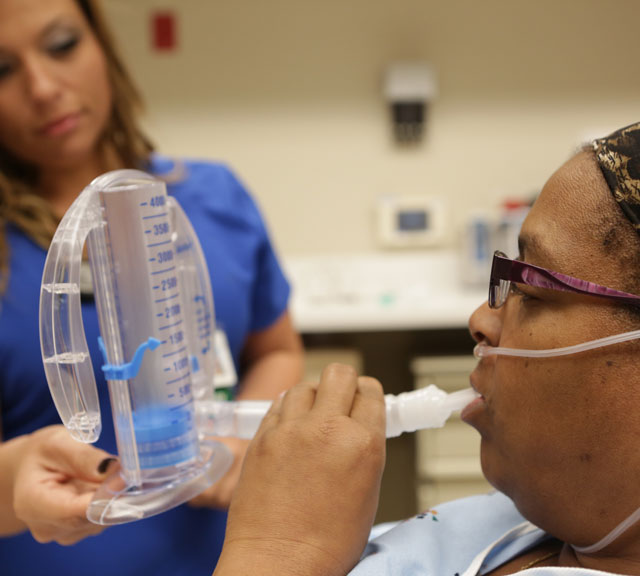What’s Behind That Cough?

Find Your Perfect Match
Answer a few questions and we'll provide you with a list of primary care providers that best fit your needs.
Coughs have one thing in common: They’re annoying. To you, the cougher. And anyone around you.
But coughs come in many forms — caused by various conditions. Pinpointing the cause of your cough — and treating that — is the best treatment strategy.
Though bothersome and tiresome, coughing does you a favor. It’s a natural defense against disease. Coughing clears your respiratory tract of germs, mucus and foreign particles — and protects your lungs from infection and inflammation.
Coughs come in two primary forms — acute, or short-term, and chronic, or long-term.
Causes of Acute Coughs
Acute coughs typically clear up in a few days to a few weeks. They result from acute, or sudden onset, illnesses. These range from common, everyday ailments, like the common cold and episodes of hay fever, to serious, potentially life—threatening causes, such as heart failure and blood clots in the lungs. Acute cough causes include:
Upper respiratory tract infections. These throat infections are primarily caused by viruses. They include the common cold, laryngitis and the flu. They’re the most common causes of acute, or short-term coughs, and can also give you a fever, sore throat and runny nose.
Lower respiratory tract infections. These infections hit below your throat, causing coughing and fever. In your airways, they cause acute bronchitis. And when these infections reach your lungs, they can cause pneumonia.
Reactions to stuff in the air. For instance:
- Hay fever, or allergic rhinitis, a reaction to allergens, such as pollen. The reaction brings on symptoms like the common cold — a dry cough, sneezing and runny nose.
- Breathing in irritants, such as chemical fumes, dust or vapors that inflame your throat and airways, causing you to cough. Being exposed to these irritants without protection on an ongoing basis could lead to chronic coughing and lung disease.
Post-nasal drip. This is a bonus symptom you may experience with a respiratory infection or allergy. Like it sounds, it’s a dripping of mucus from the back of your nose. And it can irritate your throat, giving you a dry cough.
Congestive heart failure. With this condition, your heart loses its effectiveness to pump blood. This leads to fluids building up in your lungs, causing shortness of breath and coughing. Coughing may bring up blood and froth. Breathing may become more difficult when you lie down.
Blood clot in the lung (pulmonary embolism). Blood clots that form in leg veins can move up into one of your lungs – a potentially life-threatening event. When a clot moves into a lung, you’ll suddenly be short of breath and may cough.
Gastro-esophageal reflux disease (GERD). If you have GERD, or acid reflux disease, stomach acid makes its way up the esophagus, possibly into the throat. A dry cough may accompany throat irritation.
Collapsed lung (pneumothorax). Lungs can collapse or deflate spontaneously or as the result of chest trauma in an accident. Smokers with a history of emphysema are at increased risk. Symptoms include sudden chest pain, shortness of breath and dry cough.
Pinpointing the cause of your cough — and treating that — is the best treatment strategy.
Causes of Chronic Coughs

Chronic, or long-term, coughs last for more than three to eight weeks, sometimes for months. Even years.
As a woman, you’re at greater risk for developing a chronic cough. Women have a more sensitive cough reflex than men. Chronic cough causes include:
Smoking. Chemical irritation from cigarette smoking is the leading cause of chronic cough. Repeated exposure to the toxins of cigarette smoke can progress from “smoker’s cough” to more serious and potentially life-threatening conditions. These include bronchitis, emphysema, pneumonia and lung cancer.
Chronic lung diseases: These include asthma, bronchiectasis (enlarged airways) and chronic obstructive pulmonary disease (COPD). Chronic bronchitis and emphysema are two common types of COPD.
Chronic lung infections. For instance, tuberculosis, which can cause fever, night sweats and cough, sometimes with blood.
Lung cancer. Cancer can start in the lungs or spread from other organs. Lung cancer can cause cough, sometimes with blood.
Medications. (ACE inhibitors), a type of medication prescribed to control high blood pressure, can cause dry cough.
Prolonged exposure to irritants. You’re at risk of chronic cough if you work around dust, sprays, chemical and other irritants — and don’t use appropriate protection.
Treatment of Coughs
How you and your health care provider treat your cough depends on the cause.
Many coughs will resolve themselves. And over-the-counter medications are often all that’s needed to help control symptoms of a common cold or other upper respiratory infection.
More serious conditions that cause coughs, such as COPD or asthma, may require inhalers and other treatment.
A cough that persists calls for medical attention. Contact your doctor, who may need to conduct tests to determine your cough’s cause. Along with a physical exam, tests may include a chest X-ray, blood sample, throat swab, phlegm sample and spirometry, to measure your ability to breathe out.
Keep in mind that viruses cause most respiratory infections, such as the common cold. Antibiotics are effective only for the minority of respiratory infections caused by bacteria. Your health care provider will determine when you need an antibiotic – and what kind.
Once your doctor determines the cause of your cough and begins treatment, you can ask for her recommendations of a suppressant to control your cough.
Be aware that certain warning signs could indicate that your cough involves a more serious disease or condition. Contact your health care provider immediately. These signs include:
- Chest pain
- Shortness of breath
- Rapid breathing
- Coughing up blood
- Rash and facial swelling
- Fever
Find Your Perfect Match
Answer a few questions and we'll provide you with a list of primary care providers that best fit your needs.
Source: American Lung Association; MedlinePlus; Harvard Health Publishing




